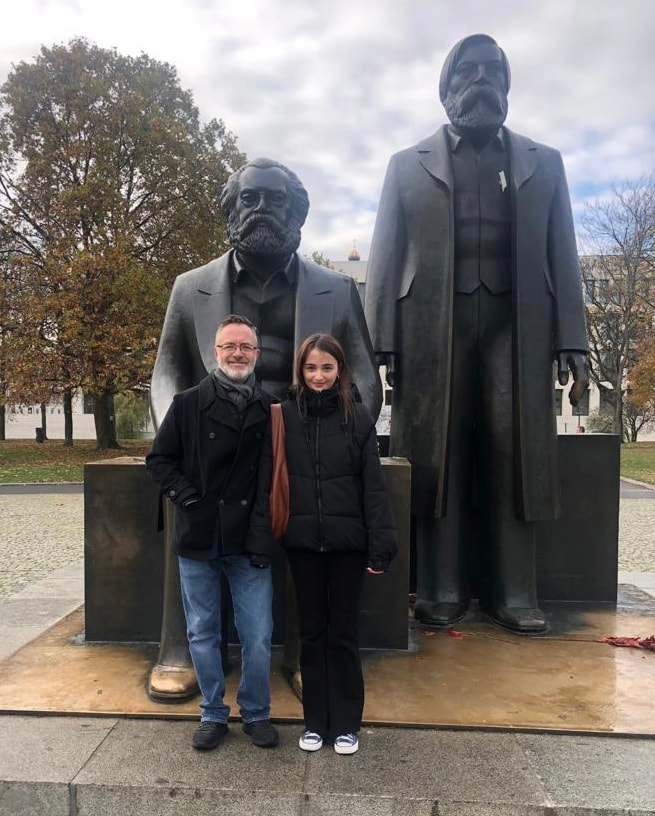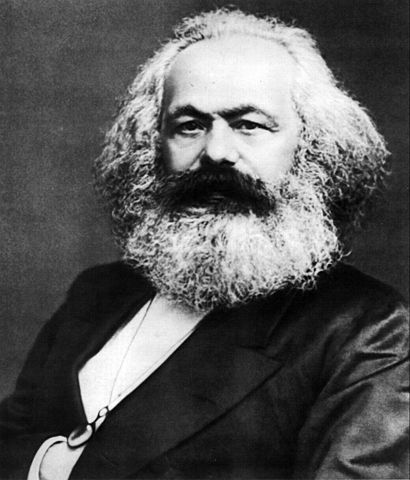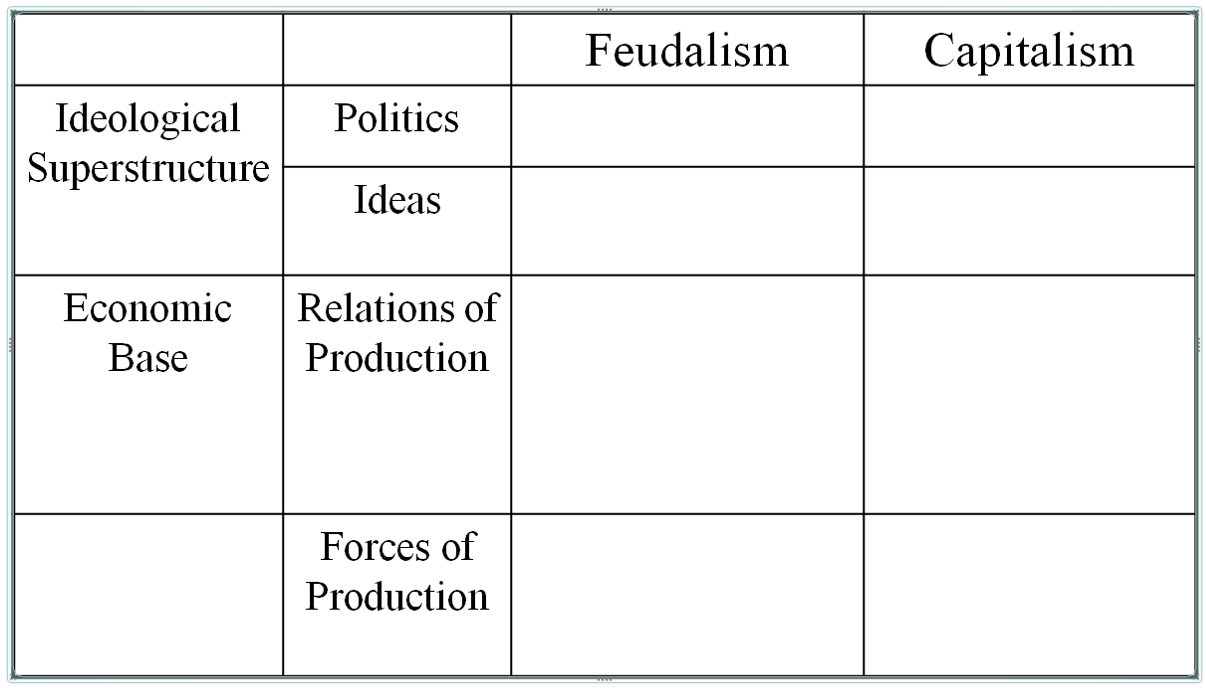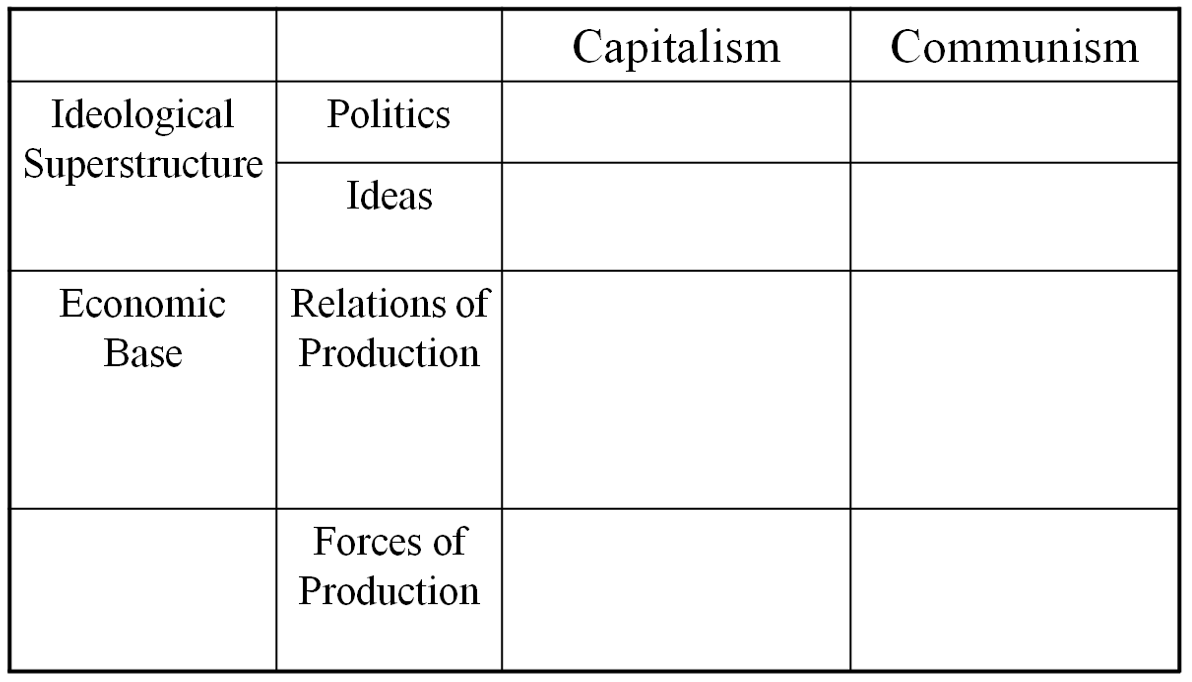Lesson 4 - Marxism
|
Marxism is central to our understanding of the 20th century. As Marxist-Leninism (communism) it was one of three rival forms of political 'ideologies' that sought to inspire and organise politics and society in the modern world. After the First World War, communism along with fascism, attempted to replace the dominant ideology of the west, capitalist liberal democracy.
Understanding Marxism is essential to making sense of the Russian Revolutions and the Cold War, and it is also specified as a subject for examination in the oral exam on Russia and in the Industrial Revolution, which states : faire une étude comparative des théories communistes de Karl Marx et des mouvements présocialistes.' See Matu 4 Pre-socialist Movements (Before 1848)
1. Pre-socialist peasant and working-class movement. (See Matu 4, Lesson 7)
|
2. Utopian socialists
Overall, the main ideas of utopian socialists like Saint-Simon, Fourier, and Owen revolved around the creation of ideal communities based on principles of cooperation, equality, and social justice. They imagined societies where individuals would be free from the inequalities and injustices of capitalist systems, and where the needs of all members would be met through collective effort and solidarity. Marx considered them to be utopian because they focused on creating ideal communities without addressing the underlying issues of exploitation and alienation. Marx believed their approaches were unrealistic that failed to provide a practical path towards achieving socialism.
Overall, the main ideas of utopian socialists like Saint-Simon, Fourier, and Owen revolved around the creation of ideal communities based on principles of cooperation, equality, and social justice. They imagined societies where individuals would be free from the inequalities and injustices of capitalist systems, and where the needs of all members would be met through collective effort and solidarity. Marx considered them to be utopian because they focused on creating ideal communities without addressing the underlying issues of exploitation and alienation. Marx believed their approaches were unrealistic that failed to provide a practical path towards achieving socialism.
Henri de Saint-Simon |
1760 - 1825 |
French |
Saint-Simon advocated for a technocratic society led by scientists, engineers, and industrialists who would plan and organize economic activity for the benefit of all members of society. He proposed the abolition of private property and the establishment of a meritocratic system where individuals would be rewarded based on their contributions to society rather than inherited wealth or status. |
Charles Fourier |
1772 - 1837 |
French |
Fourier developed the concept of phalansteries, which were self-sufficient communities where people would live and work cooperatively. Fourier's vision included the abolition of traditional marriage and the establishment of "sexual freedom" . Fourier's ideas also included the reorganization of work into a series of tasks that would be rotated among members of the community to prevent monotony and promote personal fulfillment. |
Robert Owen |
1771 - 1858 |
Welsh |
Robert Owen was a successful industrialist who improved the living and working conditions of his workers. He believed that environmental factors, such as education and social institutions, were the main reasons for bad human behavior, rather than innate characteristics. Owen set up New Lanark in Scotland and New Harmony in the United States where workers would collectively own and manage the means of production, thereby eliminating exploitation and promoting equality. |
|
Marx
Karl Heinrich Marx was born on 5 May 1818 in Trier in western German, the son of a successful Jewish lawyer. Marx studied law in Bonn and Berlin. In 1841, he received a doctorate in philosophy from the University of Jena. In 1843 Marx and his wife Jenny moved to Paris where he met his lifelong collaborator, Friedrich Engels. Expelled from France, Marx spent two years in Brussels, where his partnership with Engels intensified. They co-authored the pamphlet The Communist Manifesto which was published in 1848. Think about the significance of that in the context of what you studied earlier this year. In 1849, Marx moved to London, where he was to spend the remainder of his life. For several years, his family lived in poverty, but the wealthier Engels was able to support them. In 1864. he was one of the founding members of the International Working Men's Association (International) and wrote their initial programme. Marx spent most of his time in the reading room of the British Museum and was unable to attend the meetings of the International in Geneva (1866) and Lausanne (1867). His most important work Capital was published in 1867. He died on 14 March 1883 and was buried at Highgate Cemetery in London. |
Marxism
Marxism is a political theory where the main concern is to explain the hidden workings of capitalism as socio-economic and political system and to guide the way towards the establishment of a future communist society.
Changing human history is explained by the ways in which humankind innovates and exploits technology, organising the economy and social relations, in order to produce the necessities of life as efficiently as possible. Marx characterised human history in terms of the way in which ownership of the means of production (the relations of production or classes) was the most important single variable involved in the characterisation of each distinct period (or epoch) in history.
He identified five major epochs: Primitive communism - ancient epoch (slave society) - feudal society - capitalist society – and finally communist society - where the means of production are held in common for the benefit of everyone in society. In this society class conflict is finally resolved and no further form of society can ever develop. Marxism emphasises the idea that social life is based upon conflicts of interest. In capitalism this conflict is that between the Bourgeoisie (those who own and control the means of production in society) and the Proletariat (those who simply sell their labour power in the marketplace of capitalism)
For Marx, revolutionary social change is an inevitable consequence of inequality and the resulting class conflict. Marx argued capitalism had been wonderfully progressive but would eventually collapse because of its inherent contradictions, that result from the need of the most successful capitalists to exploit the proletariat more effectively that their rivals and for this increasingly exploited proletariat to grow in number.
Marxism is a political theory where the main concern is to explain the hidden workings of capitalism as socio-economic and political system and to guide the way towards the establishment of a future communist society.
Changing human history is explained by the ways in which humankind innovates and exploits technology, organising the economy and social relations, in order to produce the necessities of life as efficiently as possible. Marx characterised human history in terms of the way in which ownership of the means of production (the relations of production or classes) was the most important single variable involved in the characterisation of each distinct period (or epoch) in history.
He identified five major epochs: Primitive communism - ancient epoch (slave society) - feudal society - capitalist society – and finally communist society - where the means of production are held in common for the benefit of everyone in society. In this society class conflict is finally resolved and no further form of society can ever develop. Marxism emphasises the idea that social life is based upon conflicts of interest. In capitalism this conflict is that between the Bourgeoisie (those who own and control the means of production in society) and the Proletariat (those who simply sell their labour power in the marketplace of capitalism)
For Marx, revolutionary social change is an inevitable consequence of inequality and the resulting class conflict. Marx argued capitalism had been wonderfully progressive but would eventually collapse because of its inherent contradictions, that result from the need of the most successful capitalists to exploit the proletariat more effectively that their rivals and for this increasingly exploited proletariat to grow in number.
The 10 point programme from the Communist Manifesto
1. Abolition of property in land and application of all rents of land to public purposes.
2. A heavy progressive or graduated income tax.
3. Abolition of all right of inheritance.
4. Confiscation of the property of all emigrants and rebels.
5. Centralisation of credit in the hands of the State, by means of a national bank with State capital and an exclusive monopoly.
6. Centralisation of the means of communication and transport in the hands of the State.
7. Extension of factories and instruments of production owned by the State; the bringing into cultivation of waste-lands, and the improvement of the soil generally in accordance with a common plan.
8. Equal liability of all to labour. Establishment of industrial armies, especially for agriculture.
9. Combination of agriculture with manufacturing industries; gradual abolition of the distinction between town and country, by a more equable distribution of the population over the country.
10. Free education for all children in public schools. Abolition of children’s factory labour in its present form. Combination of education with industrial production, etc.
Karl Marx and Friedrich Engels, The Communist Manifesto, 20–21. (Brussels 1848)
Much of Marxism’s continued relevance stems from its need to explain why capitalism has still not collapsed. Central to this is Marxism’s explanation of the relationship of the capitalist economy to society as a whole, the Marxist model of economic base and the political and ideological superstructure. Those who own and control the means of production (the economic infrastructure) are powerful in that society because they are able to use wealth to enhance and expand their power. However, this economically powerful class has to translate this power into political power (control over the State, machinery of government and so forth) and ideological power (control over how people think about the nature of the social world, capitalist society and so forth). Marxists use the concept of hegemony (in basic terms, leadership with the consent of the led) to express this relationship.
There are two ways in which a ruling class can consolidate its hegemony over other classes: Through the use of force (formal control - the police and army etc.) and through the use of ideology / socialisation (informal control - the mass media, education etc.) In capitalist democracies the latter will be most important since a ruling class seeks to control and exploit the proletariat by trying to convince them that this society is the best of all possible worlds. Some Marxists use the concept of false consciousness to explain how the proletariat is fooled by a ruling class into accepting the values of capitalist society (a member of the working class is falsely conscious of their true class position when they fail to see themselves as a member of an exploited, oppressed, class cf. Trump/Brexit supporter).
The concept of alienation is used to refer to the way in which capitalist society degrades both the bourgeoisie and the proletariat. The proletariat are alienated from society because although they are responsible for producing goods co-operatively (for the potential benefit of society as a whole), the fruits of their labour are taken by the bourgeoisie (in the form of profit) for their private use. The bourgeoisie are alienated from their fellow human beings because of their exploitation and oppression of the rest of society. This condition of alienation is used to explain why such things as crime occurs in society - the social bonds that should tie people together are fatally weakened by the exploitative relationship between the classes. Alienation is also used to explain how people are alienated in the workplace by the repetitive, monotonous and degrading work that capitalism requires most of society to do.
There are two ways in which a ruling class can consolidate its hegemony over other classes: Through the use of force (formal control - the police and army etc.) and through the use of ideology / socialisation (informal control - the mass media, education etc.) In capitalist democracies the latter will be most important since a ruling class seeks to control and exploit the proletariat by trying to convince them that this society is the best of all possible worlds. Some Marxists use the concept of false consciousness to explain how the proletariat is fooled by a ruling class into accepting the values of capitalist society (a member of the working class is falsely conscious of their true class position when they fail to see themselves as a member of an exploited, oppressed, class cf. Trump/Brexit supporter).
The concept of alienation is used to refer to the way in which capitalist society degrades both the bourgeoisie and the proletariat. The proletariat are alienated from society because although they are responsible for producing goods co-operatively (for the potential benefit of society as a whole), the fruits of their labour are taken by the bourgeoisie (in the form of profit) for their private use. The bourgeoisie are alienated from their fellow human beings because of their exploitation and oppression of the rest of society. This condition of alienation is used to explain why such things as crime occurs in society - the social bonds that should tie people together are fatally weakened by the exploitative relationship between the classes. Alienation is also used to explain how people are alienated in the workplace by the repetitive, monotonous and degrading work that capitalism requires most of society to do.
In conclusion, Marx is a turning point in the history of socialism because he consciously breaks with 'utopian socialism' which focused on simply imagining a world beyond capitalism. Instead Marx focused on understanding capitalism, where is came from, how it worked and why it would inevitably collapse. Marx refused to go in for 'writing recipes for restaurants of the future', he doesn't describe what a communist society will look like.
Marx is still important today, not so much for what he said about socialism but rather how he analysed capitalism. You might also find it useful to watch the Crash Course sociology video which should make sense if you've understood what I have said.
Marx is still important today, not so much for what he said about socialism but rather how he analysed capitalism. You might also find it useful to watch the Crash Course sociology video which should make sense if you've understood what I have said.
|
|
|
|
Activities
1. Make some brief notes about the pre-Marxist socialists. You might watch the video Heaven on Earth and pay particular attention to the first section about Robert Owen. Heaven on earth is a somewhat critical documentary on the history of socialism from an American perspective. The film goes on to cover Marx and importantly the split in the world socialist movement between reformist socialists led be Eduard Bernstein and the revolutionary tradition which in the 20th century became inextricably linked to the work of Vladimir Lenin. |
|
2. Make copies of (and complete) the following diagrams.
3. Explain according to Marxism (a) what was wrong with capitalism (b) why capitalism would inevitably self destruct.
Extension suggestions
Further reading
Marx's 1859 preface, cartoon explanation of historical materialism. Communist Manifesto (edited to essentials). My former teacher Alex Callinicos and the world's most famous Marxist geographer, David Harvey explain Marxism as only Marxists can do - video. Want to study sociology at Yale? Professor Iván Szelényi explains Marx's historical materialism as part of a series of lectures on Marxism.
Further reading
Marx's 1859 preface, cartoon explanation of historical materialism. Communist Manifesto (edited to essentials). My former teacher Alex Callinicos and the world's most famous Marxist geographer, David Harvey explain Marxism as only Marxists can do - video. Want to study sociology at Yale? Professor Iván Szelényi explains Marx's historical materialism as part of a series of lectures on Marxism.
|
|
|




